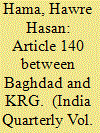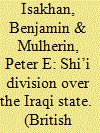| Srl | Item |
| 1 |
ID:
170634


|
|
|
|
|
| Summary/Abstract |
The Iraqi state and the Kurds have always been at the odds over the territory around Kirkuk, particularly following the discovery of oil in the province in 1927. Both sides have claimed ownership of the province since that time and have sought to gain advantage over the other through various means. The region was subjected to a forced demographic change under the Arabisation policy during the reign of Ba’ath Party between 1968 and 2003. Following the overthrow of Saddam’s regime in 2003, the status of Kirkuk was to be constitutionally and peacefully resolved according to Article 58 of the 2004 interim constitution and then Article 140 of the 2005 permanent constitutions, which called for normalisation, a census, and a referendum in Kirkuk and other disputed areas to determine the will of their residents. Practically, however, various Iraqi governments and the two dominant Kurdish parties, the Patriotic Union of Kurdistan and the Kurdistan Democratic Party, were able to politicise implementation of Article 140. Although each blame the other, all share responsibility for the lack of implementation. This research investigates that experience and argues that the joint administration is the optimal scenario in the short run and independent region within the Iraqi state would be the best-case scenario in the long term.
|
|
|
|
|
|
|
|
|
|
|
|
|
|
|
|
| 2 |
ID:
176555


|
|
|
|
|
| Summary/Abstract |
This article traces the evolving political platform of one of Iraq’s oldest and most powerful Shi’i political parties, the Islamic Supreme Council of Iraq (ISCI). Drawing on an analysis of 15 years of primary materials produced by ISCI, it focuses principally on their promotion of decentralization as a path towards peace and stability in Iraq. However, the article also traces the origins of a deep schism that emerged within ISCI between the movement’s old guard who were beholden to the Iranian regime and their model of vilāyat-i faqīh, and the youth-led Iraqi nationalist faction who wanted to see the instalment of a civil government without religious oversight. The article demonstrates that this division is indicative of a theological debate between Shi’i religious scholars over differing interpretations of the role of Shi’ism in politics. The article concludes by arguing that understanding the extent to which such esoteric religious debates manifest themselves politically is crucial to interpreting divisions within Shi’ism not just in Iraq, but across the broader Middle East.
|
|
|
|
|
|
|
|
|
|
|
|
|
|
|
|